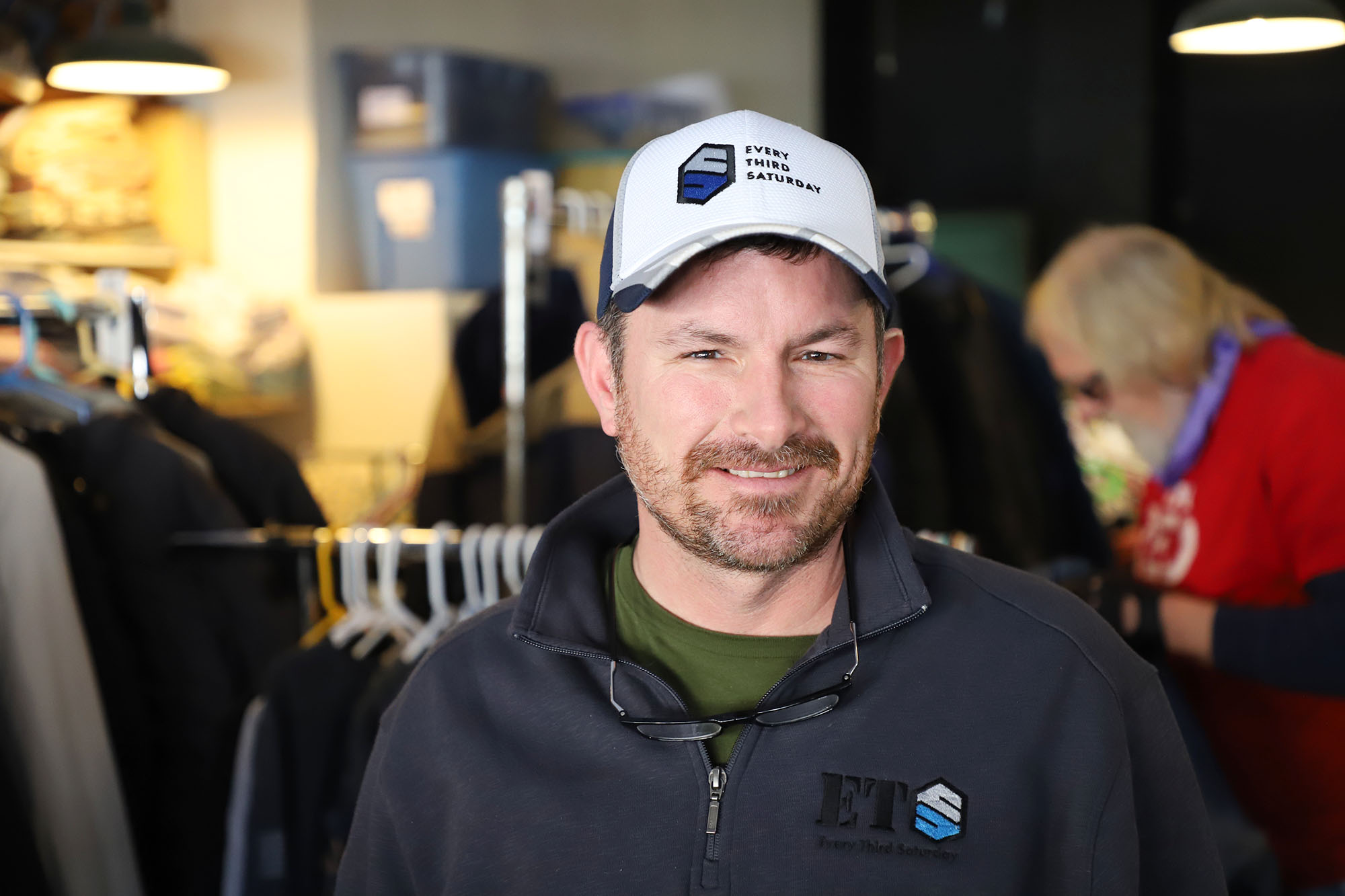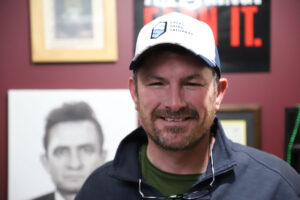
‘Able to act now’
By Tim Engstrom
MINNEAPOLIS — There’s a place just six blocks west of the Minneapolis VA Medical Center on 54th Street where veterans can find clothing, boots, blankets, sleeping bags, towels, sheets, pillows, bags, hygiene products, financial assistance, temporary shelter, Alcoholic Anonymous meetings and programs for emotional and mental health.
And a friendly cup of joe.
The location also is a resource center, connecting veterans with organizations that help with employment, housing, legal services and VA claims.
It’s called Every Third Saturday, and this spring the nonprofit is going to depart the place it has rented for five years and move across the street into its own building.
That new place will have a full-fledged coffee shop employing veterans, a fitness center, a community space that will be much like a military day room, offices, a classroom for programs and, notably, a clothing area that will feel more like a store than the crammed, free-stuff shop ETS presently has. The idea is to give its patrons proper dignity in the exchange.
It all started because, in 2009, Marine veteran Tom McKenna saw a homeless veteran holding a cardboard sign on a corner in Fridley that said, “Please help.”

“I wanted the light to turn green so bad. It was uncomfortable,” he said.
Later, he felt bad about his reaction, and he went back the next day to see if the man was there. He was. McKenna spoke with him.
“I thought he was going to ask for money. He asked for underwear and socks,” McKenna said.
The man had been homeless for a week. He arrived home one day to find his wife and kids had left him, taking all money and belongings. Other people were even living in the apartment. He had no resources. Nothing.
McKenna took the man to Walmart and purchased socks and underwear.
“I never saw him again.”
He and his wife, Jessi, began driving around to find homeless veterans and give them what they needed. Today, that effort is Every Third Saturday.
It has a staff of two full-timers, Executive Director Jessi McKenna and Program Director Jon Engfer. There are four part-timers. McKenna himself is an unpaid volunteer.
“We fit into the gaps no one else can fill,” he said.

An example: The VA called ETS on Jan. 20 about a veteran who was going into the hospital and needed a way to store his stuff but couldn’t afford a storage locker. ETS provides up to three months of storage.
“Now this veteran can go to the hospital without worrying about his stuff,” he said.
Another: One veteran got a much-needed job but needed a bicycle to get to work. ETS bought him a bike.
“It’s pretty easy stuff,” McKenna said.
He credits Jessi for her operational skills.
“She’s the maestro. She makes it all work together.”
Tom is an American Legion member with Wold-Chamberlain Post 99 in Minneapolis. Jessi is a member of Auxiliary Unit 99. They thank several posts of The American Legion for support.
“When The American Legion says, ‘Yes, we believe in you,’ that’s a good endorsement. We value that highly,” he said.

McKenna, 47, graduated from high school in Levittown, N.Y., in 1992. He was a good pitcher and played baseball for State University of New York.
He had a solid fastball, but the 12-6 curveball damaged his elbow and slowed down his pitches. The team released him, and, because he didn’t go to classes, so did the school. His father said he couldn’t return home.
He was working for a Coca-Cola distributor at the time, and across the street was a Marine Corps recruiting station. It was off to MEPS in Brooklyn, then to basic at Parris Island, S.C. He went on to the School of Infantry East at Camp LeJeune, N.C., and Security Forces School in Chesapeake, Va.
There, he received close quarters battle training, better known as CQB, along with personal protection and counterterrorism.
By 1994, he became part of a Marine Corps CQB Team at Patuxent River Naval Air Station, Md. He earned his way onto a Recapture Tactics Team, or RTT, that frequently flew on TACAMO aircraft.
TACAMO is a strategy to maintain communications among decision-makers in the event of nuclear warfare. The acronym stands for “Take Charge and Move Out,” coined in 1961, and it has employed various kinds of aircraft, depending on the era. In McKenna’s day, it was the Boeing E-6A Mercury. (Today, it is the E-6B.)

McKenna pretty much has flown all over.
The Mercury would fly in wide circles with a trailing antenna five miles long. This is to communicate with submarines without giving away their location. They could send and receive on any frequency.
They were mission-ready to be part of Operation Looking Glass, an airborne command should the ground-based centers become inoperable.
In March 1995, he was part of a six-man detail to provide security in Erbil, the capital of the Kurdistan Region of Iraq. Rival Kurdish factions were fighting it out in what is now called the Kurdish Civil War, and the conflict drew in Kurds from neighboring countries. In Baghdad, Saddam Hussein and his large army were in power, providing supplies and forces to perpetuate the conflict. The U.S. had pledged to protect the Kurds from Saddam.
Just two weeks earlier, McKenna had been part of the withdrawal of Marines from Somalia. His RTT could be called anywhere, but for defensive roles, not offensive. McKenna was the squad leader by now.
They spent two nights on a ship in the Mediterranean Sea. (Like a true Marine, McKenna called it a “boat.”)
Then it was off to Incirlik Air Base, Turkey, then a chopper to Erbil. They encountered Army Rangers who were there to conduct evacuations for Kurds who had helped the United States.
The Marine RTT was there for a different mission — to protect Iraqi politician Ahmed Chalabi, founder of the Iraqi National Congress. It was a CIA-backed government-in-waiting that sought to depose Saddam.
His team provided security for Chalabi’s meeting in a small conference room off the lobby of a hotel. During the meeting, the civil war came to them. A grenade broke the big glass window of the lobby and exploded.
“They likely didn’t realize we were there,” McKenna said.

The blast killed one of McKenna’s Marines, Rick Sears of New Hampshire, who had been posted outside the conference room door.
Chalabi and everyone in the conference room lived. In 2005, the politician served a year as deputy prime minister of Iraq. He died in 2015.
When McKenna got back to Maryland, he began to notice health problems.
“I was a squad leader, and I was falling behind on runs. I couldn’t figure out why or what was going on,” he said.
Supervisors made him go to Bethesda Naval Hospital, and doctors determined it wasn’t asthma. They found he had scarring in the bottom lobes of his lungs. They asked him if he smoked. He did not.
Meanwhile, he also suffered from PTSD.
“As a squad leader, to lose someone was difficult,” McKenna said.
The U.S. Marine Corps prepared him for the loss of a fellow Marine during combat, but he wasn’t prepared for the actions of his chain of command.
“The executive officer blamed me for the incident. It left a wound that was really hard to take,” McKenna said.
He and his Marines drank heavily after that. One attempted to kill himself by crashing his car into a tree.
“We had practiced that drill a thousand times, then to get told it was your fault. We had to live with that blame, and it was the ’90s. We were not really allowed to ask for help,” McKenna said.
The drinking never affected work hours — but when they were off-duty, it was full-on self-medication.
“There was no recognition that someone may be feeling something. You are just supposed to go back to your job,” he said.
The situation spun him pretty good. That and the health problems led to a medical discharge. He didn’t want to leave the Marines.
“I fought it the entire way,” he said.

His best guess at the cause was white phosphorus from the grenade blast. A doctor at Bethesda mentioned seeing that kind of injury before.
It’s too bad, too, because McKenna had been approved to enter the Enlisted to Officer Program. His final day was March 15, 1996.
“Everyone I love and care about is in the barracks, and I am out, and I can’t even go inside.”
McKenna went back to Coca-Cola, but off-base in Maryland. He became a delivery man, driving a tractor-trailer. He married his sailor girlfriend in 1997, and they moved to New York for a year, but then they went to Minnesota, to the little town of Stewart in McLeod County. They had a son in 1998.
“I was still fighting and drinking and being a general idiot,” McKenna said.
When the boy was being born, there was concern in the delivery room about the birth. McKenna threw the doctor up against the wall and told him to make sure the kid got out safely or there would be a problem.
Security removed him from the room and made him wait outside for 30 minutes.
“It was during that 30 minutes I just locked up — put away all that PTSD, drinking. It was an important moment.”
The boy was born just fine. (And today, he is an Army veteran and Legion member.)
McKenna, meanwhile, got his act together. The couple had a daughter in 2000. They also split up that year.
He moved to Bloomington and began working daily as a route driver at Coke in Eagan, then as a distribution supervisor. In 2005, he married Jessi, and they bought a house in Apple Valley. She had a son from a previous marriage, and he had his two kids, and they became one big blended family.
By 2010, McKenna wanted to do something more. He wanted to help veterans. In 2011, he went to work for Disabled American Veterans of Minnesota. He was the department service officer for one year, working out of the Minneapolis VA Medical Center. Then he was a national service officer working at the Whipple Federal Building until 2016.
It was then he and Jessi started Every Third Saturday as a formal nonprofit organization.
They had been setting up every third Saturday at the VA parking lot for years. They handed out clothes, footwear, toiletries, sleeping bags, duffel bags, backpacks, coats, socks and underwear to veterans who needed it. They began serving a lunch, too.
“It just kept growing and growing. We would get donations, and all of a sudden, our basement was full. Our garage was full,” McKenna said.
Normally, the VA doesn’t allow such uses of federal property, but the Minneapolis VA did, pausing one year only briefly to require certain paperwork.
One of the Every Third Saturday initiatives is called Warrior’s Path. It focuses on “post-traumatic growth.” McKenna said it teaches veterans and their families to take their trauma and become stronger for it and to turn it around to help others.
There are 34 people who speak over the course of five weeks — from experts, doctors, professionals, first responders, even an NFL strength coach. It challenges participants to grow.
“The Warrior’s Path is not a program. It is a course of study to learn how to drop labels such as ‘broken,’ ‘damaged’ and not be anchored to diagnoses such as PTSD,” says the ETS website.
McKenna said he works closely with the Minnesota Assistance Council for Veterans (MACV), along with the Minneapolis VA and county veteran service officers to assist veterans in need.
“We are able to act now,” he said. “We have times where we put a homeless veteran up in an extended-stay hotel until we can make sure he is through the intake at MACV.”
He estimates ETS assists about 100 veterans a month. He credits God and many great helpers for getting the nonprofit to where it is today.
In the past ETS received some Support Our Troops license-plate grant funding, but right now, it operates solely off private donations, such as the ones from charitable gambling conducted by Legion posts.